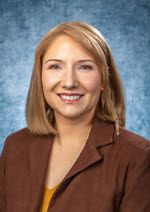
No Comments on DCT Librarian Selector Profile: Emily Weyant Blevins, MLIS, AHIP 69
Emily Weyant Blevins, MLIS, AHIP
Senior Clinical Reference Librarian/Assistant Professor
Quillen College of Medicine Library
East Tennessee State University
Editor’s note: This month, we are celebrating Emily Weyant Blevins, who has served as a Librarian Selector for Doody’s Core Titles since 2016.
Where do you currently work and what is your position?
I’m currently the Senior Clinical Reference Librarian and an Assistant Professor at East Tennessee State University’s Quillen College of Medicine Library located in Johnson City, TN.
Provide a brief description of your library and its services.
Our library primarily serves the students, faculty, and staff of the Quillen College of Medicine (QCoM), as well as residents and attendings at our clinical sites; however, we also work with other members of the East Tennessee State University (ETSU) community, including students and faculty in related fields such as public health, physical therapy, nursing, pharmacy, and more. In clinical settings, librarians assist with point-of-care searching, research, and resource facilitation for evidence-based medicine and improved patient care. In the classroom, our librarians are involved in instruction as well as interprofessional, team building, and equity activities. Professional development and community outreach are facilitated by our library in the form of individual research and collaboration with outside entities such as the National Network of Libraries of Medicine (NNLM), Remote Area Medical Clinics, local parks, religious organizations, and community centers. We also work in the equity space through community outreach, development of collections that represent a variety of perspectives and issues, and creation of educational sessions on topics such as bias, structural competency in healthcare, and the history of racism in OB/GYN.
When did you start in health sciences librarianship? What was your position? With what institution?
I started my career in health sciences librarianship in 2012 as an Oak Ridge Institute for Science and Education (ORISE) Fellow at the Centers for Disease Control and Prevention (CDC) in Atlanta, GA. I graduated with my library science degree that year and was fortunate enough to be able to pursue my interest in health sciences librarianship at this institution. As a fellow, I was able to learn different facets of this career under the mentorship of my colleagues and supervisors such as Gail Bang and director Cate Canevari, who were instrumental in supporting my early career education in this field.
Name two of the most important issues facing the profession today.
In my opinion, two of the most important issues facing the profession today are information overload and critical appraisal/analysis/thinking, which go hand in hand with the rise of artificial intelligence. While I do believe that there are appropriate uses and opportunities for artificial intelligence in the field, consumers and professionals alike must continue to exercise critical thinking and cross-checking of sources. As librarians this is something that we are familiar with providing instruction on in the academic arena, but I find that enforcing this thought process is becoming even more important in daily life. I frequently remind myself to slow down and digest/assess information before making snap judgements on the veracity of claims or information provided.
What is one innovation, product, or service in your library that you’re excited about?
I am currently excited about our rejuvenated outreach initiatives and opportunities. These include a suite of classes led by my colleagues, Dr. Rick Wallace, Nakia Woodward, and myself, aimed at providing the Consumer Health Information Specialization from NNLM to librarians across the state of Tennessee; our revamping the library collection at a local community center with which we collaborate; increased integration of library collections into the medical school curriculum via professional development classes for faculty; and increased librarian roles in courses.
Why do you serve as a DCT Librarian Selector?
I have served as a DCT Librarian Selector since 2016. Initially, I served because I was aware of the tool from a collection development perspective and wanted to become more familiar with the selection process. I continue to contribute as I feel that it is a service to the profession. I have always been grouped with reviewers whose opinions I respect and have been recommended materials that I may have not considered otherwise due to working with them.
Anything else you’d like to share?
Thank you to Doody’s for featuring and working with us!


Leave a comment